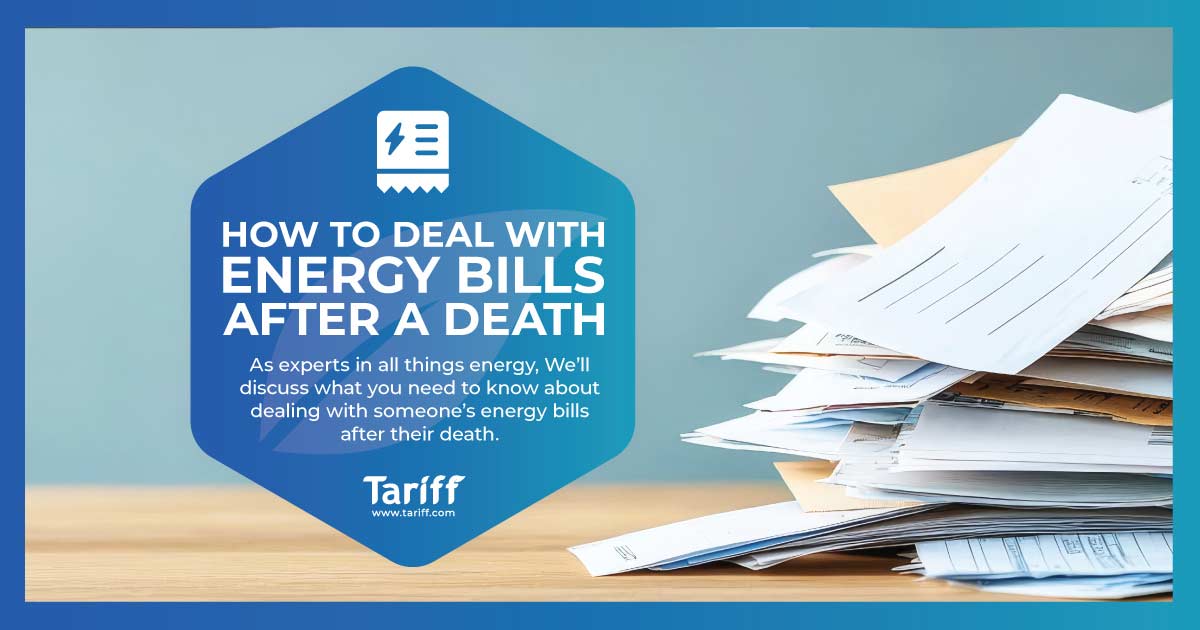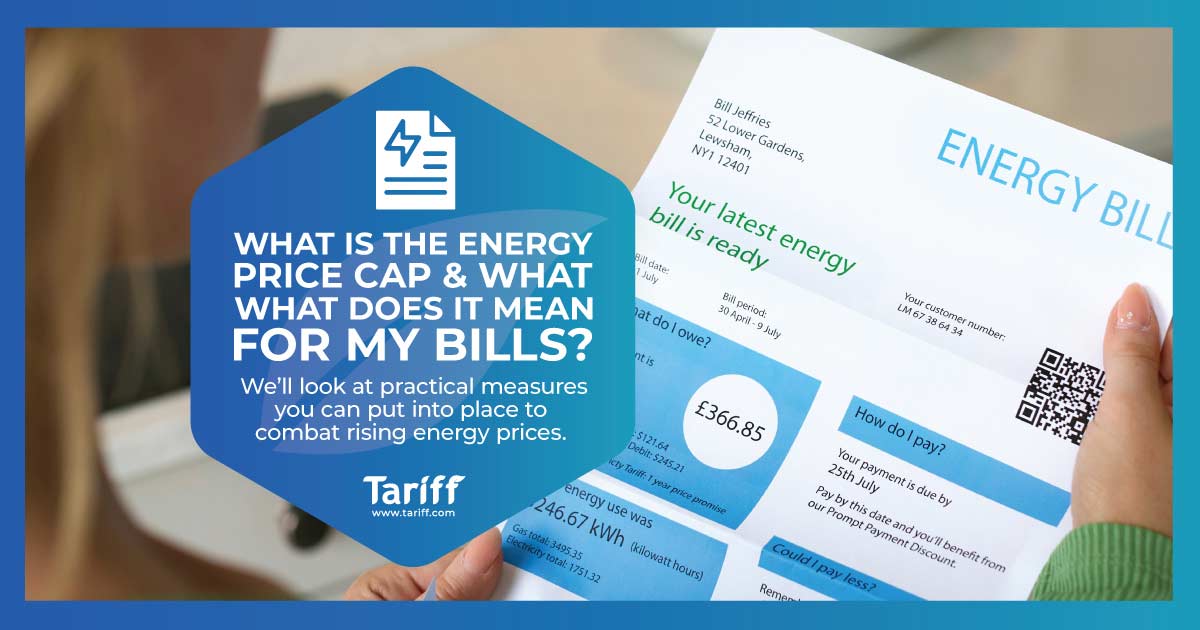How To Deal With Energy Bills After A Death
While it’s naturally the last thing we’ll want to think about after a death, there are a few areas that you really can’t afford to overlook. That could be in planning for funeral costs, organising the deceased’s estate, or simply trying to bring together family members, and it’s a stress few want to consider after losing someone.
In all of this, there’s also the person’s energy bills to consider. Again, that’s not a pleasant consideration – and almost certainly not at the top of your priority list – but it can mercifully be a simple process to sort out. That’s where Tariff’s latest blog comes to the fore.
As experts in all things energy, we don’t shy away from the difficult topics. We’ll discuss what you need to know about dealing with someone’s energy bills after their death, how you can arrange the final payments, and the meter readings and information you’ll need to provide.
3 Steps To Dealing With Energy Bills After A Death
We’re looking to simplify the process of organising those energy bills after someone dies, and we’ve narrowed it down to just three simple steps you’ll need to follow.
Step 0- Look After Yourself
One thing we’ve noticed as we’ve written pieces around things like climate anxiety, fluctuating energy bills, and price caps is that energy can be a stressful topic to address. It’s not surprising, especially given the news stories and changes we see on an almost constant basis.
Make sure, before you follow our steps on how to deal with energy bills after a death, that you take the time to look after yourself. Take a break in between the things you need to organise to practice mindfulness, whether that’s walking out in nature, speaking to family and friends, or simply taking the time to process any grief you might be experiencing.
You might also find that you need more support, especially if there’s a significant financial or emotional burden. Charities like Mind can provide more dedicated mental health support during difficulties like these, and you’ll always be in contact with someone who understands the link between finances and mental health.
We know this can be a difficult time, no matter your relationship with the deceased, and the first step should always be to prioritise your own mental wellbeing.
Step 1- Contact Their Utility Company & Make Arrangements
The first step of the process should be to contact the deceased’s utility company to alert them of the person’s death. Most utility companies will have a policy or procedure in place to make arrangements, meaning that there’s likely to be minimal input from you at this stage.
Anyone can make that initial contact with the energy company to let them know the person has died. You can delegate this to a friend or family member if you’re able to provide them with the account number and information about the deceased.
Many people opt to do this themselves, particularly if they’re nominated as the “Executor of the Will” (usually the next of kin or someone named as the Executor in the person’s will). This is usually because they’ll take on responsibility for any outstanding payments to be made, including energy bills.
However, for organising any larger finances or outstanding payments, you may need probate. As defined by the UK government, this is the legal right to deal with someone’s property, money and possessions (their “estate”) when they die. This is usually only needed for larger holdings (like houses or other property) but can be needed if there’s a large amount of energy debt.
This is a rare circumstance, but it’s worth noting as part of the first step towards sorting out those energy bills after a death.
Step 2- Take A Final Meter Reading At The Property
This will likely be something that’s mentioned when you first get in touch with the deceased’s energy company, but it’s best to take things one step at a time. If you feel able to do so, visit the dead person’s property to collect the last meter readings. If you don’t, ask a friend or relative to visit in your stead and report the meter readings accurately.
This should be done once the property is no longer occupied and once no more electricity is being used. Standing charges and other components of your utility bill are likely to be added on even after power has stopped being consumed, so alerting the energy company in advance lets them know not to bill the property any further.
You’ll need to take readings for all meters at the property. Most properties will have three different meters:
- An Electricity Meter – Usually located near the fuse box (often under the stairs) or in the hallway. Some new-build properties may have this in the hallway.
- A Gas Meter – Less common now, but you’ll usually find your gas meter in a utility cupboard or outside the property in a dedicated meter box.
- A Water Meter – This can be under the kitchen sink, in a box or under a lid outside of your home.
You’ll then need to pass this on to the relevant company. For example, if the person gets their electricity and gas through British Gas and their water through United Utilities, you’ll need to submit the relevant meter readings to the correct companies.
Step 3 – Settle Any Outstanding Balances
Once you’ve submitted those final meter readings to the relevant companies, you’ll likely receive the last bill shortly thereafter. Depending on when you let the utility company know about the deceased, these shouldn’t be too expensive and will likely only encompass charges for anything that was left on or running (like a fridge, television, or other devices).
There’s, unfortunately, no way around this. While it can feel almost like salt in the wound at a difficult time, there are options available. This is why we’d recommend letting the utility companies know as a matter of priority, as they’re able to stop any latent or additional charges that could come from delayed payment.
If you find yourself in financial difficulties as a result of an unexpected bill (if the death was sudden, for example), you’ll also have options available to you. We’d recommend speaking to the energy provider directly and explaining the situation – most providers will have a system in place to help you deal with the additional expenses.
This can come in multiple different forms, but it’s most commonly worked out as a payment plan in conjunction with you and your bank. You might also be entitled to a home energy grant, particularly if the person had received the Warmer Homes Discount Scheme, the Winter Fuel Payment.
If you’re still unsure, or you’ve been unable to successfully negotiate payment terms with the deceased’s energy provider, you do still have options available. Ofgem’s rules mean that energy providers “must work with you to agree on a payment plan you can afford”, which can extend to things like:
- Payment breaks, reductions or freezes
- Extended time to pay
- Access to hardship funds (most energy companies will have dedicated funds or schemes for times of difficulty)
Certain charities and government-backed nonprofit organisations can also provide help if you’re dealing with energy bills after a death. Scope, for example, offers support to those who struggle to pay energy bills as a result of a disability, while the Fuel Bank Foundation can provide vouchers or credits for gas cards and electricity keys.
Finally, never be afraid to ask for help from family or friends. A death can weigh differently on everyone, and the most important thing you can do is to communicate and work together to both process your grief, and deal with any additional expenditure.
What Happens To Business Energy Bills After A Death?
Generally, in this scenario, the bills will become the responsibility of one of two different people. If the person who’s died had a business partner, the responsibility for continuing to pay those bills (and updating any necessary information with their business energy provider) becomes theirs.
If the deceased was a sole trader or operated the business by themselves (as a Limited Company), the business energy bills will be passed across to the Executor of the Will. If this is you, you’ll take on responsibility for any remaining energy bills that the business uses. You’ll also need to decide whether or not the company ceases to trade or not.
If you decide to close up the company, the process for organising business energy bills after a death follows much the same process as any domestic utilities. You’ll need to get in contact with their energy provider (you can normally find this on a bill or bank statement) and first alert notify them of the death.
You’ll then provide any final meter readings. Most businesses will only use electricity and water, but it’s important to double-check if there are any gas appliances like an oven or boiler. Once you’ve taken these, the relevant business energy provider can then issue the final bill.
If you opt to continue operating the company after the person has died, you’ll likely want to consider your options for cheaper energy bills, especially if there are other expenses you’ll have to consider. That’s where Tariff can help.
When you’re ready, get in touch with us to discuss your options for changing to an energy deal that suits your personal circumstances. We’re one of the UK’s most trusted business energy switching services, and can source a deal that’s designed with you in mind.




